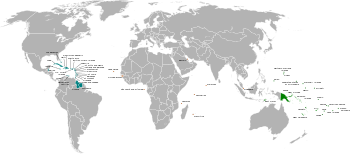
The Small Island Developing States (SIDS) are a grouping of developing countries which are small island countries and small states that tend to share similar sustainable development challenges. These include small but growing populations, limited resources, remoteness, susceptibility to natural disasters, vulnerability to external shocks, excessive dependence on international trade, and fragile environments. Their growth and development are also held back by high communication, energy and transportation costs, irregular international transport volumes, disproportionately expensive public administration and infrastructure due to their small size, and little to no opportunity to create economies of scale. They consist of some of the most vulnerable countries to anthropogenic climate change.
The SIDS were first recognized as a distinct group of developing countries at the United Nations Conference on Environment and Development in June 1992. The Barbados Programme of Action was produced in 1994 to assist the SIDS in their sustainable development efforts. The United Nations Office of the High Representative for the Least Developed Countries, Landlocked Developing Countries and Small Island Developing States (UN-OHRLLS) represents the group of states.[1]
- ^ "Office of the High Representative for the Least Developed Countries, Landlocked Developing Countries and Small Island Developing States |". United Nations. Retrieved 2022-07-10.